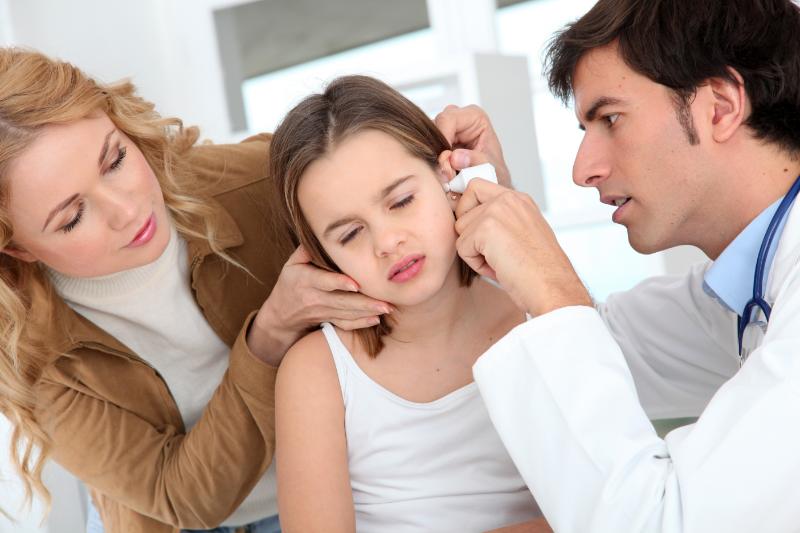Ear infections, medically known as otitis media, are one of the most frequent types of illnesses in childhood. These can affect children of all ages, from newborns to adolescents, and often cause symptoms like fever, difficulty hearing, swelling, and pain.
Ear infections tend to develop due to upper respiratory infections, which could cause the germs to travel to the middle ear, causing swelling and pain. While mild earaches and infections typically don't lead to long-term problems when managed properly, discussing any concerns about your child's health with your doctor is always important.
Paying close attention to the signs of ear infections in young children and newborns is essential since they can't express their discomfort directly.
Some signs that could help you identify an ear infection in your child include the following:
- High body temperature
- Lack of energy
- Difficulty hearing
- Discharge running out of the ear
- Itching and irritation around the ear
- Scaly skin around the ear
- Discomfort and swelling inside the ear
Young children and babies with ear infections could show symptoms such as:
- Rubbing and pulling their ears constantly
- Not reacting to some sounds
- Becoming irritable
- Sudden loss of appetite.
If fluid buildup in the ear goes up and the pressure increases too much, your child’s eardrum could become ruptured. This could cause symptoms like feeling dizzy, nauseous, buzzing in the ear, and having trouble with balance.
Factors that could increase the risk of a child developing an ear infection include:
- Age: Children younger than two years are more prone to developing ear infections due to the size and shape of their eustachian tubes and their still-developing immune system. These tubes are in charge of connecting the middle ear to the nasal cavities.
- Childcare: Children who attend daycares are more likely to develop illnesses since they could be exposed to bacteria and infections from their playmates.
- Bottle-feeding: Babies who drink formula from a bottle tend to have more ear infections due to the position in which they are fed.
- Season: Ear infections tend to be most common during colder seasons like fall and winter.
- Air quality: children who are exposed to tobacco smoke or air pollution often could have higher chances of developing an ear infection.
Most cases of mild ear infections in children do not cause long-term complications. However, when ear infections reoccur often and are left untreated, they could lead to severe complications, such as:
- Impaired hearing
- Speech or developmental delays due to impaired hearing
- Spread of infections to nearby tissues
- Tearing of the eardrum
Whether or not your child is undergoing antibiotic treatment, you can alleviate their discomfort by implementing simple at-home remedies.
If your child has an earache, you can try the following tips to reduce the symptoms:
- Use over-the-counter painkillers, such as paracetamol or ibuprofen.
- Place a warm or cold flannel over the ear.
- Remove any discharge by carefully wiping the ear with cotton wool.
If your kid has an earache:
- Do not use cotton buds or fingers inside the ear to remove earwax.
- Never use aspirin in children, as it may cause a disease called Reye’s syndrome.
- Do not use decongestants or antihistamines.
If your child’s ear infection doesn’t improve after three days of taking over-the-counter medication, and they continue to have high body temperature (fever), you should schedule an appointment with your pediatrician.
Call your doctor immediately and take your child to emergency care if you notice the following signs:
- Severe ear pain
- Fever of over 105° F
- A stiff neck
- Bothered by light
- Unusual cold hands and feet
- Blue, pale, or blotchy skin, lips, or tongue
- Weak, high-pitched cry
- Sluggishness or trouble waking up
- Trouble breathing
- Leaning forward and drooling
- Presence of blood or pus-filled fluid draining from the ear
- Severe belly pain
- Severe shaking
Your pediatrician will consider various factors before initiating treatment for an ear infection, such as the nature and severity of the symptoms, the duration of the infection, and its impact on your child's hearing.
Treatment may entail hearing tests, examinations to rule out other conditions, and antibiotic therapy to combat the infection.
In cases where children experience frequent ear infections and potential speech delays due to hearing impairment, ear tube surgery may be recommended. This procedure is rarely necessary, but it is a minimally invasive procedure to aid fluid drainage from the middle ear and equalize pressure.
Ear infections are often a symptom of an underlying condition or factor. By following preventative measures, you can avoid ear infections from recurring:
- Prevent colds by teaching children to hand wash correctly and not allowing them to share food, cups, or other utensils with other kids.
- Avoid exposure to tobacco smoke, and do not allow others to smoke around your child.
- Breastfeed your baby, if possible, during the first six to 12 months to foster the development of antibodies.
- Bottle-feed your baby in an upright position to prevent formula or other fluids from collecting within the ear.
- Stay up to date on vaccinations, including yearly flu shots for children six months and older.


